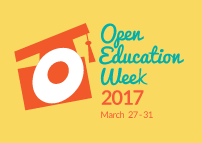
Open Education Week,
March 27-31, 2017, is an
international event whose goal is to highlight how open education can help people meet their goals in teaching and learning. Each year, as part of Open Education Week, UBC showcases diverse events highlighting areas of open teaching and learning that UBC’s faculty, students and staff participate in as well as guests from local and global community. These events include discussion forums, lectures, seminars, workshops, and symposia on topical and timely issues. All of these events are FREE and open to the public, students, faculty, staff and schools. This year’s UBC Open Education Events include:
The Failure of Access: Rethinking Open Education
The use of open re-use licenses and Internet technologies have long promised to reduce barriers to education by making it more distributed, equitable, and open. Indeed, the promise of open education can trace its roots to the the Universal Declaration of Human Rights, adopted by the United Nations 1948, which states “everyone has a right to education.” However, there is little formal evidence that open education has an impact on increasing access to learning or making education more equitable.
UBC is honoured to be collaborating with Simon Fraser University, BCcampus, and the Public Knowledge Project in this event that will explore the goals, failures, and successes of open education. Join us in exploring such questions as: is open education succeeding in being a transformative movement that makes learning more accessible? What are the criteria and successes that should be used to measure if the open education movement is a success? What more needs to be done?
This event is free but registration is required. More information, including speaker information and a full agenda, will be available soon.
Art + Feminism Wikipedia Edit-a-Thon
In a 2011 survey, Wikimedia found that less than 13% of its contributors are female. The reasons for the gender gap are up for debate: suggestions include leisure inequality, how gender socialization shapes public comportment, and the contentious nature of Wikipedia’s talk pages. The practical effect of this disparity, however, is not. Content is skewed by the lack of female participation. Many articles on notable women in history and art are absent on Wikipedia. We invite people of all gender identities and expressions, particularly trans- and cis-gendered women, to address this absence by organizing in-person, communal updating of Wikipedia’s entries on art and feminism.
Vancouver will be hosting a third annual Art + Feminism edit-a-thon.. This event is organized by UBC faculty member Christine D’Onofrio, with support from the Helen and Morris Belkin Art Gallery, Wikimedia Foundation and through the Art+Feminism platform.
Open Scholarly Practice
In this session, we’ll explore ideas of open scholarly practice in the digital age and how they can inform or be applied to teaching and learning. How has scholarly practice changed and what are the possibilities that open practices and platforms open up when students and faculty members become co-creators engaged in meaningful, generative work? We’ll look at emerging practices at UBC that are engaging students as producers of knowledge using open platforms to align classroom spaces with scholarly practice.
[citation needed] – Librarians Improving Wikipedia
In a time when “post-truth” politics prioritize sentiment and personal belief over facts, it is more important now than ever to support the dissemination of information with reliable and verifiable evidence. Librarians are uniquely positioned to do just that! As fundamental allies to the mission of Wikipedia, collecting and disseminating the sum of all knowledge, librarians can support the quality of information in Wikipedia articles by including footnotes to reliable sources to allow Wikipedia readers to “verify” what they read and learn.
 Open Education Week, March 27-31, 2017, is an international event whose goal is to highlight how open education can help people meet their goals in teaching and learning. Each year, as part of Open Education Week, UBC showcases diverse events highlighting areas of open teaching and learning that UBC’s faculty, students and staff participate in as well as guests from local and global community. These events include discussion forums, lectures, seminars, workshops, and symposia on topical and timely issues. All of these events are FREE and open to the public, students, faculty, staff and schools. This year’s UBC Open Education Events include:
Open Education Week, March 27-31, 2017, is an international event whose goal is to highlight how open education can help people meet their goals in teaching and learning. Each year, as part of Open Education Week, UBC showcases diverse events highlighting areas of open teaching and learning that UBC’s faculty, students and staff participate in as well as guests from local and global community. These events include discussion forums, lectures, seminars, workshops, and symposia on topical and timely issues. All of these events are FREE and open to the public, students, faculty, staff and schools. This year’s UBC Open Education Events include:
